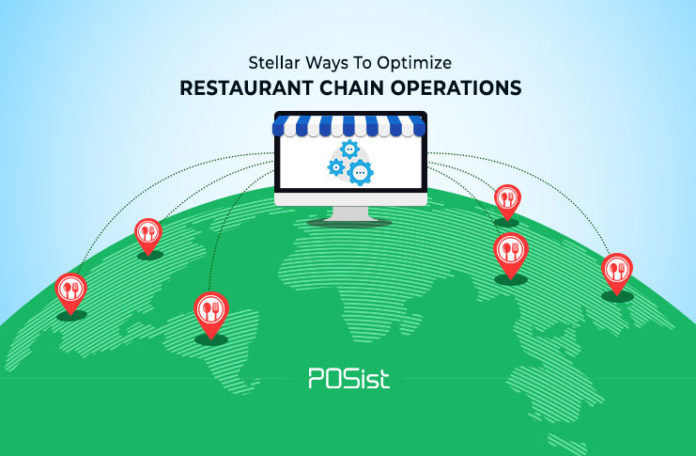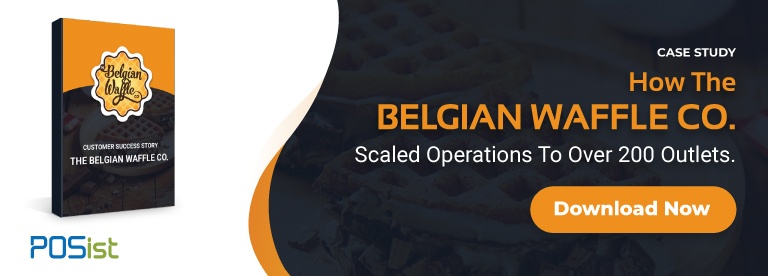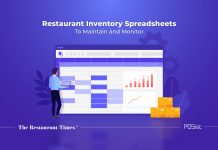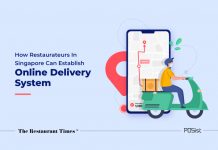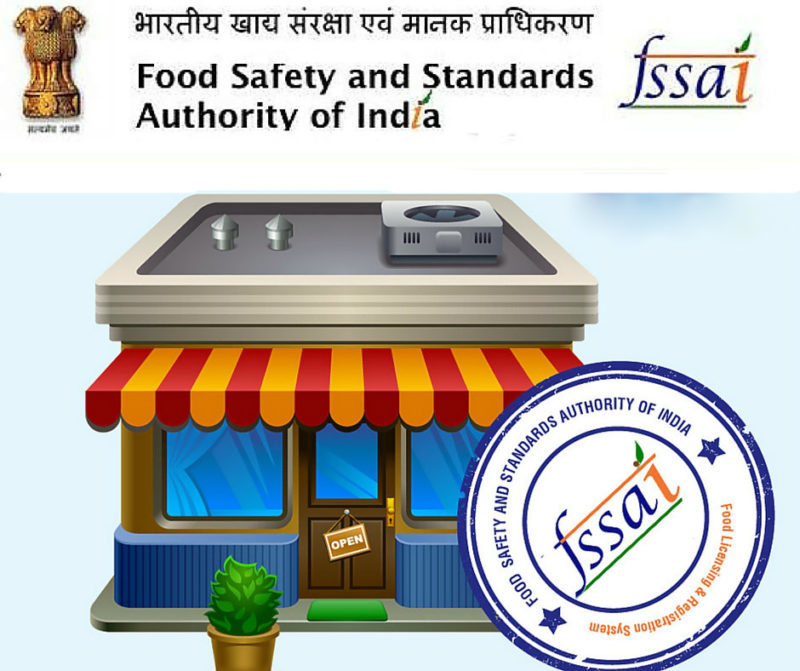Singapore’s F&B industry has seen a massive boom in the past few years. While acknowledging that restaurant operations are an enormous task, it is even more difficult to streamline the operations of chain restaurants. You need to have tight control and receive detailed reports of all your restaurant outlets in real-time, that will help you make the appropriate changes to bolster your profits like never before.
Initially, the restaurants in Singapore were using legacy POS, but as the industry grew, the importance of having a scalable restaurant POS was realized, and thus there was this swift shift, and the era of the smart cloud-based restaurant POS came into existence. The cloud POS has now evolved to become a comprehensive restaurant enterprise software that encompasses all the features of restaurant management.
The statistics say, in 2014 the total number of establishments in the F&B sector was 6,871, which increased to 7,229 in 2015 and further grew to 7,679 in 2016.
Considering the huge competition at hand, you’ve got to walk that extra mile and set the processes straight to make your chain restaurant successful. It is virtually impossible to manage multiple outlets of a large restaurant chain manually, and this is where you can take the help of technology.
A robust restaurant enterprise software automates the entire process, gives you a central control over all your operations, and optimizes the processes. Read on to know how enterprise POS can streamline your restaurant chain operations with ease.
How A Restaurant Enterprise Software Optimizes The Operations of Chain Restaurants
One of the main concerns of restaurant owners is having no control over the operations of the chain restaurants. You should understand that simply relying on the manager to monitor the daily reports is not something that you should look forward to. Not only is this manual processes time-consuming, but it also leaves a lot of sope of discrepancies and internal thefts.
Hence, it is advisable for you to rely on a cloud-based restaurant management system that would provide you with real-time reports of all the outlets that will help you make comprehensive data-driven decisions.
Read below to know what all you should have in a restaurant enterprise software that will help you optimize the operations of your chain restaurants.
1. Real-time Reporting & Analytics
Keeping a track of the business of all the outlets becomes extremely tedious while running a restaurant chain. Restaurants tend to rely on the manager of each outlet for the reports which leads to a lag in reporting and often errors and discrepancies as well.
Here comes the importance of having a robust restaurant POS on board. No matter where you are, you can view all the reports of your business right on your mobile phone, real-time. As a restaurant owner in Singapore, here are some of the top reports should be monitoring on a daily basis.
- Total bills generated – You must receive reports about the total bills generated across all the outlets. Moreover, a robust POS should also provide you with itemized individual billing details of all the outlets. This will help keep the misappropriations behind the counter under check.
- Total number of Items Sold – Another way by which you can check behind the counter thefts is by tracking the total number of items sold. It will also help you analyze your menu and know which are the items that are performing brilliantly, and the ones that are not generating enough ROI. Based on the reports, you can then undergo menu engineering to scrap of the least selling items with more variations of the most selling ones.
- Track discounts in details – Different outlets need to have different discounts and offers running. It imperative for you to have a detailed report of the total number of discounts provided, to understand whether your restaurant staff follows all the rules and norms of the discounts.
- Sales details – It is essential to review the daily and monthly sales happening at each of your chain restaurants outlets. Use your restaurant management system to view the live sales details of each outlet in your mobile. This will give you not only net sales and gross sales of each outlet and total but also the amount spent by each customer in individual outlets.
- Beginning and Closing Inventory – Receiving detailed reports of the beginning and the closing inventory is crucial as it will help you tally this with the inventory reports to track any misappropriations that might be happening at the outlets.
- Graphical representation of data – This is exceptionally important especially when you are running chain restaurants. This data will help you understand the psyche of the customers of different outlets and will help you take outlet specific decision to bolster your restaurant operations immensely.
2. Stock & Inventory Management
A typical restaurant in Singapore spends almost 31.8% of its total operating expense on the purchase of goods and raw materials. With 31.8%, buying of goods and the raw material becomes the highest area on which the restaurant spends. Hence, it becomes all the more important for restaurants, to reduce wastage of raw materials and diligently apply inventory control techniques that will save the restaurant from burning a hole in the pocket.
While managing stock and inventory of a single outlet is tedious, think about the massive task at hand when you are running chain restaurants. Here an integrated restaurant management system will come in handy, which will be able to provide you with detailed reports about the daily stock consumption, the beginning and the ending inventory and should be empowered to send you real-time alerts whenever an item reaches its reorder level, across all the outlets.
Whenever an item reaches its reorder level you as a restaurant owner will receive real-time reports and will help you keep track of the purchase orders raised at the system, which will send direct emails to the vendor. This way, you can monitor the status of the stock items purchased and received without visiting the outlets physically.
3. Central Kitchen Management
In chain restaurants, maintaining consistency is the fundamental prerequisite. It is not unlikely for a customer to expect the same quality, quantity and the same level of customers service across all the chain restaurant outlets. The concern of maintaining consistency regarding food will be solved if you set up a base kitchen, where all your raw materials will be semi-processed, which will then be delivered to the respective outlets depending on the indents raised by them. In this arrangement, the vendors will deliver the raw materials to the base or the central kitchen and not to the outlets directly.
Hence, having central kitchen management will not only ensure that the consistency is maintained which will increase your brand image, but it will also help you streamline your entire chain restaurants kitchen operation.
4. Recipe Management
Maintaining consistency across all the outlets of chain restaurants is a task that many fail to master. However, you must understand when multiple outlets are running under the same brand name; it is only natural for your customers to expect the same quality of food and ambiance across all your outlets. This emphasizes having a recipe management feature at your restaurant.
Sit with your head chef and create a standardized recipe for all the dishes on the menu. This should include the ingredients required and its quantity, the method of cooking and presentation in details, and all the chefs at different outlets need to do is follow the recipe diligently.
Not only will this ensure standardized service and help you in maintaining consistency, but it would also help you streamline your inventory requirements. A comprehensive recipe management feature will help you in reducing the kitchen waste generation which will have a direct influence on reducing the unnecessary expenses in your chain restaurants in Singapore.
5. Vendor Management
In large chain restaurant steups, there are multiple vendors that a restaurant owner deals with on a daily basis. And managing all these vendors coherently becomes a humongous task.
Hence, it is necessary for you to have a vendor management feature in your restaurant POS, which allows you to create and manage vendor profiles of different outlets at a central level. The vendor profiles must also have the contract details of each vendor, and the respective vendors must have access to their respective profile where they can comment, accept or reject the purchase orders placed by the outlets.
6. Central CRM
With the high competition in the Singapore food industry, it becomes imperative for you to take steps to retain customers. This increases the importance of maintaining a detailed CRM. Having a restaurant POS that comes with the central CRM feature will help you in ways more than one.
For one, the customer for one outlet will become the customer for the entire brand. The CRM will provide you with all the details, like the customers’ name, contact details, ordering history, the bill generated. All these details will automatically be visible to all the outlets of the chain restaurants ones it is updated on the central CRM. With the information gathered the restaurant staff could very conveniently upsell the newer items in the menu which the customer might like.
Besides, it works very well in running Loyalty Programs and Reward Points that can be utilized by the customer in all your brand outlets. Moreover, with the CRM information, your brand can run customized SMS and email marketing campaigns. All these will not only help you with customer retention and turning them into loyal ones, but it will also help you deliver stellar customer service.
7. Outlet Specific Discounts & Offers
Running outlet specific offers in a chain restaurants setup isn’t an easy task. Understanding the different geographies, the demographics and the customer psychology is difficult, and unless you can unearth the trick to understanding them, you can hardly craft effective outlet specific marketing campaigns.
You should never run a uniform marketing campaign for all your outlets, and this is where a restaurant management system will come into play. A restaurant enterprise software allows you to create custom campaigns for different outlets. When you see that sales are declining in one particular outlet, you can run specific offers and discounts or invest more in marketing for that restaurant.
Hence, the only way to make your chain restaurants a success in Singapore is by taking refuge in a stellar enterprise restaurant POS. A restaurant POS will help you streamline your entire chain operations and enables you to have tight control over all the areas of the business.
Hence, if you are planning to expand your restaurant venture, keep the points mentioned above in mind and see how your chain restaurants business flourishes.


